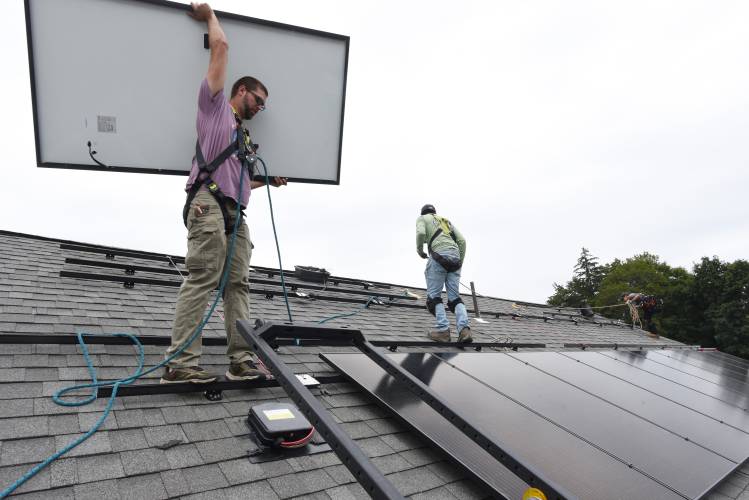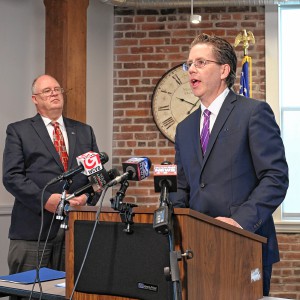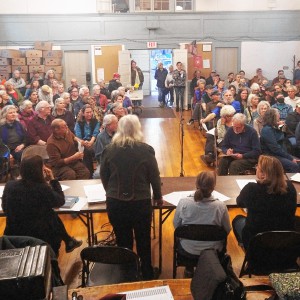Ashfield seeks feedback on expanding solar

PV Squared workers install solar panels in Greenfield. The Ashfield Energy Committee will host a public forum next week to discuss expanding solar power in town. STAFF FILE PHOTO/PAUL FRANZ
| Published: 11-02-2023 3:47 PM |
ASHFIELD — The Energy Committee will host a public forum on Monday, Nov. 6, at 7 p.m. at Town Hall to discuss expanding solar power in town.
Members of the Energy Committee have a draft solar action plan, came up with several proposals and will now share their ideas with the public, providing an opportunity for them to answer questions and hear resident concerns.
“My hope is we get public support for the program and find people interested in being part of a working group to help design what our plan will look like,” said Energy Committee Chair Alexandra Osterman.
Monday’s forum will begin with a presentation by Zara Dowling, a professor at the University of Massachusetts Amherst Clean Energy Extension. Dowling led a class in the 2022 school year where students worked with municipalities to develop solar energy plans. Student Grace Theberge worked with Ashfield, and Dowling oversaw and finished the project that will be discussed at the presentation.
After Dowling’s presentation, the Energy Committee will share a slideshow of its proposed plans for the town.
“Solar can be controversial. The key in Ashfield is that we maintain our rural character,” Osterman said.
Theberge created geographic information system (GIS) maps to find solar resources and perform an infrastructure assessment. She also created a survey to use for the planning process. The survey received 262 responses, which Osterman said was the best response rate of any municipality that participated in the program.
The survey showed that 94% of respondents felt positive about solar in general and many strongly supported getting the town to generate enough solar energy to support its own needs.
Article continues after...
Yesterday's Most Read Articles
 1989 homicide victim found in Warwick ID’d through genetic testing, but some mysteries remain
1989 homicide victim found in Warwick ID’d through genetic testing, but some mysteries remain
 Fogbuster Coffee Works, formerly Pierce Brothers, celebrating 30 years in business
Fogbuster Coffee Works, formerly Pierce Brothers, celebrating 30 years in business
 Greenfield homicide victim to be memorialized in Pittsfield
Greenfield homicide victim to be memorialized in Pittsfield
 Real Estate Transactions: May 3, 2024
Real Estate Transactions: May 3, 2024
 Battery storage bylaw passes in Wendell
Battery storage bylaw passes in Wendell
 As I See It: Between Israel and Palestine: Which side should we be on, and why?
As I See It: Between Israel and Palestine: Which side should we be on, and why?
Theberge found that the town would need to generate about 15 megawatts of electricity, or 12 times its current production rates, to support the town’s needs. These numbers are calculated with the prediction of full electrification of all the buildings and vehicles in Ashfield.
Finally, Theberge created a draft action plan for the town that looked at solar in five categories: residential, municipal, business and institutions, farmland and ground-mounted solar on private land.
With the information provided through the UMass program, the Energy Committee created recommendations.
One of its recommendations includes conducting another residential solar campaign. In 2015, Plainfield, Ashfield and Buckland worked together to conduct a campaign through which more than 100 residents signed up to get private solar energy systems installed on their properties for below-market rates.
Osterman explained that, according to the survey results, there are people in Ashfield who want solar installed on their homes who do not have it yet. Osterman said consumers like this program because it takes away the burden of doing the research themselves and provides an easy way to get solar power installed on private property.
“We want to pluck the low-hanging fruit first,” Osterman said. “We want to do something that a lot of people are in support of.”
The Energy Committee hopes the town will have municipally owned solar installed as well. There are still several questions to answer, including whether the town will use power purchasing plans or buy its own panels using grant funding. The town also needs to decide if it will use a request for proposals (RFP) process or work with the state-approved company Power Options, which contracts with the company Solect Energy.
Many neighboring towns have received grants to install solar with Solect Energy. This includes Williamsburg, which received a Municipal Vulnerability Preparedness grant to install solar panels on its Public Safety Complex, and Buckland, which got a Gap Energy Grant to install panels on its wastewater treatment plant.
“We are not looking to have the town pay fully for something,” Osterman said. “We are trying to get funding.”
The Energy Committee is still coming up with ideas for moving forward with the installation of solar panels in town. Members hope bringing the discussion to the public will create interest in the planning stages to come.
“This is about us in town working toward our state goals and shifting away from fossil fuels,” Osterman said. “To meet our climate goals, we need to make things happen at a fairly rapid pace given the realities and complexities of getting something like this done.”
Bella Levavi can be reached at 413-930-4579 or blevavi@recorder.com.

 Wear Orange organizers prepare display to remember gun violence victims
Wear Orange organizers prepare display to remember gun violence victims Deerfield candidates, Whately incumbent discuss issues with voters at South County Senior Center
Deerfield candidates, Whately incumbent discuss issues with voters at South County Senior Center
